Download PDF - Health Sciences - Curtin University
Download PDF - Health Sciences - Curtin University
Download PDF - Health Sciences - Curtin University
You also want an ePaper? Increase the reach of your titles
YUMPU automatically turns print PDFs into web optimized ePapers that Google loves.
34 35<br />
coursework degrees<br />
Sexology M/PgDip<br />
graduate profile<br />
Speech Pathology M (graduate entry)<br />
Ultrasound GCert<br />
Course outline<br />
This course provides individuals with specialist knowledge<br />
and skills in the area of sexology. Graduates should have<br />
a comprehensive knowledge of recent research examining<br />
the biological, psychological and social aspects of human<br />
sexuality. It is anticipated that on completion of the program,<br />
graduates will be able to integrate this specialisation into<br />
their professional discipline, and be conversant in the key<br />
aspects of sexology as a public health issue. Complementary<br />
study in research methods is included. Media material of a<br />
sexually graphic nature is utilised in this course.<br />
Career outlook<br />
Sexology graduates have established careers in the fields of<br />
psychosexual therapy, sexuality education and consultancy,<br />
child and elder protection, sexual health policy development,<br />
human rights, disability, cyber-safety training, health<br />
promotion, youth work, academia, medical management,<br />
risk management, sexual research and many others.<br />
Graduates may be eligible for membership of the Australian<br />
Society of Sexuality Educators Researchers and Therapists<br />
(ASSERT), which is a member of the World Association for<br />
Sexual <strong>Health</strong>. Graduates may obtain a specialist title as a<br />
psychosexual therapist, sexuality educator and/or sexuality<br />
researcher through ASSERT after completion of supervision<br />
requirements. The requirements for these titles in other<br />
countries differ.<br />
Course details<br />
Course code M – 313946 PgDip – 311948<br />
Duration<br />
M - 2 years full-time or equivalent<br />
part-time PgDip - 1 year full-time or<br />
equivalent part-time<br />
When<br />
February or July<br />
Campus<br />
Bentley<br />
Study mode M and PgDip - on-campus or mixed on- and<br />
off-campus<br />
Entry requirements M – A recognised degree in a related health<br />
profession such as medical, social work or<br />
welfare studies, theology, education, health<br />
promotion, health sciences, psychology,<br />
sociology, anthropology, or biological<br />
sciences.<br />
PgDip – A bachelor degree in a professional<br />
health field, social work or welfare studies,<br />
psychology, theology, education, biological<br />
sciences or behavioural sciences, including<br />
sociology or anthropology.<br />
Fees See page 8<br />
Supplementary information is required see page 10<br />
Nicole King<br />
Master of Forensic Sexology<br />
I had an interest in sexology and decided to undertake<br />
a master degree as I wanted more understanding of the<br />
criminological aspects of sexuality.<br />
During my studies I was able to research a topic of<br />
interest to me rather than having limitations such as<br />
only being able to work on the public health aspect<br />
of sexuality. I could combine health, criminology,<br />
psychology and sociology to create a well-rounded<br />
view necessary for understanding sexuality.<br />
The face-to-face workshops undertaken as part of my<br />
degree refined my skills and ability to discuss sexuality<br />
openly and with an audience or individual. I was<br />
exposed to concepts and points of view that helped me<br />
to challenge my own ideas and attitudes, which greatly<br />
assisted me in my professional development.<br />
Above all else, having a Masters in Forensic Sexology<br />
is an eye opener and it lets employees know that I can<br />
work with sensitive and confidential issues.<br />
graduate profile<br />
Melissa Trinca<br />
Graduate Diploma Psychology,<br />
Master of Speech Pathology<br />
After completing my undergraduate degree at <strong>Curtin</strong> in<br />
Education and Asian Languages, I aimed to undertake<br />
postgraduate studies sometime in the future and<br />
was told the opportunities at <strong>Curtin</strong> were really<br />
varied. I have always had a passion for languages and<br />
communication, but wanted to extend my knowledge<br />
and skills outside of the office and classroom.<br />
I found that this degree was structured to help you<br />
succeed; the assessments, lectures and tutorials are all<br />
integrated and I was able to grasp learnings and apply<br />
new skills under the supervision of skilled tutors and<br />
lecturers. One important point for my future career was<br />
the fact that <strong>Curtin</strong>’s course was accredited.<br />
I look forward to making tomorrow better, by providing<br />
therapy to those children who are unable to see speech<br />
pathologists for up to a year, due to waiting lists.<br />
Literacy is a major issue amongst our youth, and early<br />
intervention is key in making sure these children can<br />
have a bright future with confidence.<br />
Course outline<br />
This graduate entry masters degree provides an entry<br />
level qualification in speech pathology. It enables students<br />
to develop an understanding of normal communication<br />
development, developmental and acquired communication,<br />
swallowing disorders, speech pathology clinical practice,<br />
clinical measurement and research. Students primarily focus<br />
on four areas: behavioural sciences, cognitive neuroscience,<br />
rehabilitation science and speech science. Studies are<br />
supported by extensive clinical practice.<br />
Career outlook<br />
This course is accredited by Speech Pathology Australia.<br />
Graduates find employment in a range of public, not-forprofit<br />
and private services throughout Australia.<br />
Course details<br />
Course code 301592<br />
Duration<br />
2 years full-time<br />
When<br />
February<br />
Campus<br />
Bentley<br />
Study mode On-campus<br />
Entry requirements Applicants with an honours degree or a<br />
bachelor degree with a course weighted<br />
average of 65% are eligible for entry to<br />
the program. The application process<br />
is competitive and typically successful<br />
applicants have demonstrated a distinction<br />
average. Evidence of studies in human<br />
biology and statistics at university level<br />
is essential. Applicants without this<br />
background will have to complete additional<br />
units in this area before commencing<br />
the course. Applicants will also submit a<br />
personal statement that reflects relevant<br />
work experience and knowledge of the<br />
profession.<br />
Specific<br />
requirements<br />
See advice on communicable diseases and<br />
criminal screening page 11<br />
Fees See page 8<br />
Supplementary information is required see page 10<br />
Course outline<br />
This course aims to provide the necessary educational<br />
foundations for ultrasound operators who aim to work<br />
in defined areas of practice, rather than across the<br />
broader range of ultrasound examinations required of the<br />
Australasian Sonographer Accreditation Registry. The<br />
program therefore, without additional study, does not lead to<br />
registration with the sonography board.The course includes<br />
the foundation units that are necessary to maximise<br />
imaging capabilities. Students are required to complete<br />
one unit in the area of clinical expertise, providing them<br />
with the necessary theoretical understanding and clinical<br />
skills to produce high-quality diagnostic images and an<br />
interpretation of them.<br />
Career outlook<br />
This course is designed to enhance the capabilities of health<br />
professionals in the specialised area of sonography.<br />
Course details<br />
Course code 313509<br />
Duration<br />
1 year part-time<br />
When<br />
February or July<br />
Campus<br />
Bentley<br />
Study mode Off-campus<br />
Entry requirements Entry to the Graduate Certificate in<br />
Ultrasound requires a recognised Bachelor<br />
Degree in Medical Imaging Science or a<br />
related area.<br />
Fees See page 8



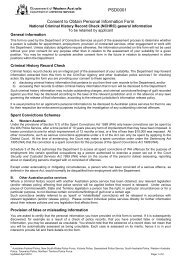
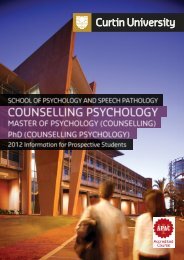
![Mental health commission report July 2010 - June 2011 [.pdf]](https://img.yumpu.com/50755705/1/184x260/mental-health-commission-report-july-2010-june-2011-pdf.jpg?quality=85)
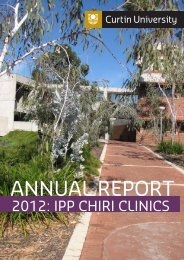
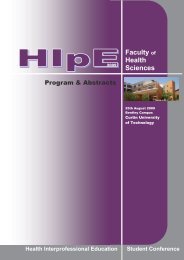
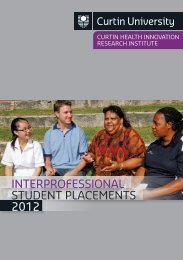
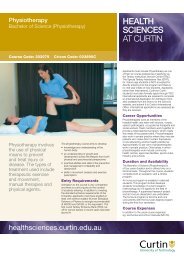
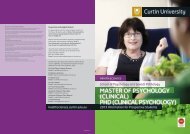
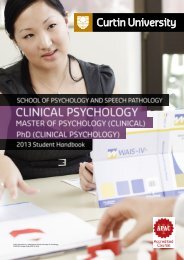

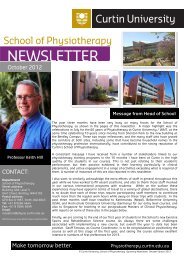
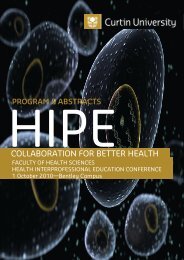
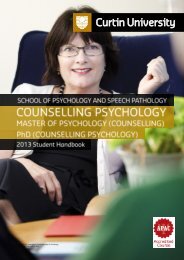
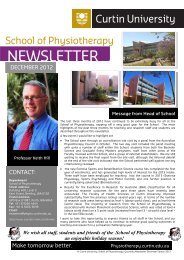
![2007 Annual Report [.pdf] - Health Sciences - Curtin University](https://img.yumpu.com/44476724/1/184x260/2007-annual-report-pdf-health-sciences-curtin-university.jpg?quality=85)